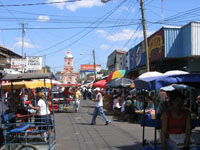- Download the full text version of the field report (PDF, 84KB)
Sarah Lucas
March 2007[1]

The news from Nicaragua is good. The Millennium Challenge Account (MCA) is living up to a number of its key principles--encouraging policy reform, maintaining political independence, promoting innovation and application of best practices, and fostering ongoing consultation. Beyond these broad principles, and despite having only nine months of compact implementation under its belt, the Nicaragua story yields a number of practical, operational lessons.
There are three headline stories in Nicaragua. First is a story of "the MCA effect"--the program’s impetus for policy reform even before a single compact dollar was spent. Second is the MCA Nicaragua’s (and the Millennium Challenge Corporation’s (MCC’s)) ability to maintain its independence, and indeed thrive programmatically, through a period of political uncertainty and transition. Third is a story of the MCA Nicaragua as a source of innovation and as a leader on applying best practices. Interestingly, all of these stories share a common subtext--effective consultation and coordination with civil society, local authorities, and central government officials.
The headline stories in Nicaragua are about the strong principles and mission of the MCA program. But at the end of the day, a mission is only as strong as the nuts and bolts of implementation, upon which the Nicaragua case offers a number of practical, operational lessons.
Next section: A Snapshot of MCA Nicaragua
1. This report is based on interviews conducted in Nicaragua in February, 2007.